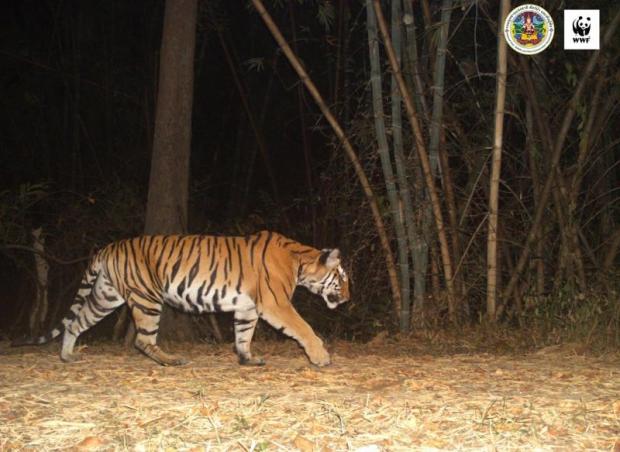
What are some of the things Thailand can do for its own benefit as well as the benefit of the world? According to B.Grimm Group's chairman Harald Link, saving our own tigers is one of them.

Harald Link, chairman of B.Grimm Group. photo: Wisit Thamngern
"There are very few countries left where tigers still live," said Link. "Everything else may exist everywhere. But sadly, tigers do not."
The big cats once roamed across Asia. It was estimated at the start of the 20th century that there were over 100,000 of them. Today, according to the World Wildlife Fund (WWF), there are only around 3,890 tigers living in the wild. Their conservation status is deemed "endangered", meaning the population is facing a high risk of extinction.
In Thailand, there are currently around 200 tigers, and most of them can be found in the western forests.
The tiger was subjected to habitat loss due to human activities, as well as poaching -- which is the most immediate threats to them. Parts of their body have always been in high demand within the illegal wildlife market, as they are believed to carry medicinal properties. This has resulted in a transnational operation in poaching to make profits from wildlife, resulting in a dwindling population.
With their presence largely gone from the forest, the ecosystem is out of balance, with the predators -- at the top of the food chain -- disappearing. As nature has a way of balancing itself out (when unaffected by humans), the population of predators and prey, as well as trees and plants, is kept in proper proportion naturally. With one of them gone from the picture, the overall system is out of control.
Since they're an umbrella species, saving tigers means also saving other species in the same area.
WWF is now driving the Global Tiger Recovery Programme (Tx2) forward in hopes of doubling the tiger population by 2022, the next Year of the Tiger. This initiative was a result of the Tiger Summit held in 2010 in Russia. Currently, 13 tiger-range countries -- Bangladesh, Bhutan, Cambodia, China, India, Indonesia, Laos, Malaysia, Myanmar, Nepal, Russia, Thailand and Vietnam -- are committed to the Tx2.
Thailand is considered one of the best conservation hopes in Southeast Asia due to our existing tiger population and natural habitat. The highest-priority tiger recovery sites in Thailand include the Dawna Tenasserim Landscape (DTL) -- made up of the Western Forest Complex (including Mae Wong and Khlong Lan National Parks) and Kuiburi-Kaeng Krachan Forest Complex -- and Dong Phayayen-Khao Yai Forest Complex.
DTL -- straddling the boundary between Thailand and Myanmar -- is one area rich in biodiversity. And it is considered one of the most intact natural landscapes in the Greater Mekong region. Its 178,896m² land is home to several endangered species, including tigers, elephants and more.
For the past four years, B.Grimm has supported WWF Thailand and the Department of National Parks in their tiger conservation project in Mae Wong and Khlong Lan national parks, which is part of the DTL. The company has helped in providing communication equipment for the rangers, as well as camera traps to monitor the movement and population of tigers as part of a smart patrol system.
"As B.Grimm, we like to support what we think is important for the country," said Link. Aside from tiger conservation, the company has also lent its support to equestrian sports, classical music and vocational training. Link said he also wishes to encourage more companies to aid in tiger conservation, adding that B.Grimm is currently the only company in the private sector supporting the tigers, as others tend to focus more on elephants.
"If we look after the tigers well, they might walk to Laos, Vietnam and Cambodia again. Then, maybe 50-100 years from now, other countries in the region will also have tigers again," he added.
In recent years, there has been talk of cutting roads and building dams within the grounds of national parks. A sinful act, Link insisted.
"Humans have already taken lots of land from the animals. They have little left. And I don't think we should intrude, but rather protect them."
He also applauded the country's rangers for their great work and the sacrifices they make preserving wildlife population, as well as being at the forefront of counteracting the poachers.
Link shared his belief that Thailand is fortunate to still be able to retain this wildlife population through conservation projects. Things, he said, are quite the opposite in developed countries, as what they are doing is rather a reintroduction of wildlife into nature, such as the wolves to Yellowstone National Park back in 1995 after the population there had been eradicated for seven decades. Reintroducing the top predator into an ecosystem has kept the population of weaker animals from getting out of control, and has also changed the park's river and forest over the years for the better.
Hopefully, this is not something Thailand will have to do in future. As the tiger population in our country still exists, we only need to keep up the work in conservation efforts and make sure the tigers are safe to continue living in the wild.
In the future, Link said B.Grimm is set to continue its dialogue with an aid to WWF, while also getting deeper into conversation with the Ministry of Natural Resources and Environment to see what other areas may need their support.

Forest rangers undergo smart patrol training. Photo courtesy of WWF Thailand